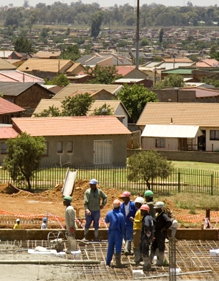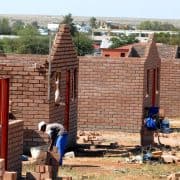|
Getting your Trinity Audio player ready...
|
 By Valencia Talane
By Valencia Talane
In the first part of our housing series we outlined some of the corruption-related challenges faced by the national Department of Human Settlements in meeting its mandate – in part two we look at the proposed measures that will help to overcome these challenges.
Gauteng's department of co-operative governance and traditional affairs and human settlements has a budget of R5-billion to build houses in the province during the 2014/15 financial year. With a new MEC at the helm to oversee the running of the department, plans have been outlined to make the allocation of houses a smoother affair.
Driven by housing concerns raised before the May 2014 elections, MEC Jacob Mamabolo recently revealed that allocation will be prioritised in the development of a new system to help curb queue jumping and corruption.
“We understand that human settlements are at the centre of service delivery, as a house carries a basket of services including water, electricity and so on,” Mamabolo recently asserted during his department’s budget vote before the provincial legislature.
The department, reported IOL in July, had been in talks with people in areas where there had been service delivery protests, including Bekkersdal, Bronkhorstspruit and Tembisa.
According to the existing housing policy of the province – which is currently under review – the department manages the system so that beneficiaries of the housing subsidy are flagged on the demand database as “inactive”, thereby avoiding conflict. Once approval from the department has been sought for an applicant, their details are highlighted as such to avoid duplication in the allocation process.
In theory, this should be the best practice for a department that services millions of prospective beneficiaries. The reality, however, is that there are residents of Gauteng who have been on what they believe to be waiting lists for years.
Many lists complicate the issue
The Socio-Economic Rights Institute (Seri) states in its report Jumping the Queue: “during apartheid a range of housing lists were drawn up, so after 1994 many people were already registered on one or more lists, and municipalities and provinces attempted to merge lists and create consolidated databases of people waiting for houses.”
The Gauteng system is the only official housing database from which prospective beneficiaries will be selected for subsidy approval by the MEC. “It will be used as information, planning and a research tool, whereby it will be able to provide information on the needs for housing by different groups within the communities,” reads the document.
Mamabolo’s plan is to spend most of the budget – fully R4.4-billion – on “all housing programmes within the department and we shall ensure that this allocation translates into new hopes for the many citizens who look up to us to provide this basic need.”
According to Mamabolo’s predecessor, Ntombi Mekgwe, Gauteng has the highest demand for government housing in the country as it has the highest population, despite being the smallest province geographically. “With this growth comes demand for houses, as people across the country come to Gauteng to seek economic opportunities, she told the legislature,” she told the legislature early last year.
“Whilst we have exceeded the one million mark, we are still faced with a huge demand of housing in Gauteng.”
Anti-corruption measures bearing fruit
The department’s commitment to get all the government employees who had benefitted unlawfully from the allocation of RDP houses had started to bear fruit, said Mekgwe, as those who were caught had started repaying government all the costs of building those houses.
Mamabolo aims to take the corruption fight further and use the same biometric system that helped to turn the Department of Home Affairs around, to fix the housing system.
The system enabled Home Affairs to implement a paperless database that relied on the capturing of fingerprints of applicants for identity documents. Such a system helps curb incidents of falsified IDs while also preventing duplicate issuing of documents.
“This will be a major milestone in using technology to ensure that the poor masses who have been waiting for years finally receive their homes. Through this process no person will have more than one RDP houses and we would have gone a long way to dealing with housing corruption,” said Mamabolo.









